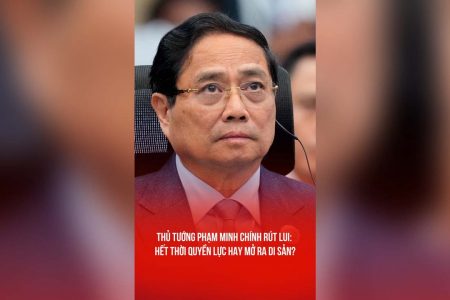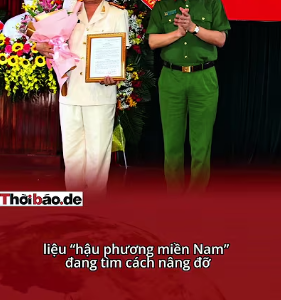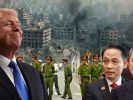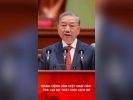
In the dense and quite tight schedule of US Secretary of State Antony Blinken to visit Vietnam with a three-day visit (April 14-16, 2023), right on Saturday, April 15, according to the official announcement from the US Department of State, the top US diplomat will visit a religious establishment in Hanoi.
Photos posted by Reuters news agency on the morning of April 15 show that Secretary Blinken and Ambassador Marc Knapper visited the Sainte Marie Monastery Church at 37 Hai Ba Trung, Trang Tien Ward, Hoan Kiem District, Hanoi.
This visit follows the busy and busy schedule of the US delegation and ranks third, after Blinken previously had a meeting with Vietnamese Prime Minister Pham Minh Chinh at 8:15 am and attended the groundbreaking ceremony of the new US embassy in Hanoi at 9:25 am on the same day.
Still according to the American delegation’s schedule and plans, the visit to St. Paul de Chartres of the Congregation of Catholic nuns in Hanoi even took place before the working lunch between Secretary Blinken and his Vietnamese counterpart Bui Thanh Son.
“A strong message in favor of religious freedom”
From Hanoi, a Catholic layman, Mr. Josephe N.V.T., who asked to remain anonymous, gave his impressions, he said:
“This monastery is next to St. Paul Hanoi.”
“In Saigon, the similar monastery is located on Ton Duc Thang street, in Ben Nghe ward, in District 1.”
“So the US Secretary will probably visit one of the nuns‘ two establishments and choose the Hanoi-based one.”
“I think this is a symbolic act, sending a strong message about supporting religious freedom.”
“Because this convent belongs to the order of nuns and was built at St. Paul Hanoi now, but the state has taken all the land, so it has to be transferred to the Lovers of the Cross as mentioned.“
„Currently, it has not been recovered because the State uses the Hospital for public purposes.“
Monastery of St. Paul de Chartres of the Order of Catholic nuns in Hanoi was built during the French colonial period in Vietnam in 1883.
According to a report on the international Catholic network related to the worldwide Congregation of Sisters, in a climax of the fight for the land and property of the church and the order, the nuns of the convent of St. Paul de Chatres in 2016 conducted many complaints, lit candles to pray, consulted to resolve disputes, stop the property violations of the Order and made recommendations to all government departments and agencies in Hanoi.
According to this source, on August 26, 2016, the Sisters of Saint Paul de Chartres and their lay advocates asked officials of the Hanoi Department of Natural Resources and Environment to respond to their complaint about who control the historic grounds of their monastery in the Vietnamese capital.
On August 28 of the same year, more than a dozen nuns and lay people submitted an application to the People’s Committee of the local district, Hanoi city and the Hanoi police agency. They also sent petitions to the leaders of the Vietnamese government and state at that time, Prime Minister Nguyen Xuan Phuc, President Tran Dai Quang and other state agencies.
And in the strongest of protests, about 50 Catholic nuns and lay people marched peacefully by candlelight early in the morning of July 25, 2016 to the disputed site near their convent, where the weekly meeting was held pray together and sing hymns.
Then, the marching group went to the headquarters of the District People’s Committee, asking the local county officials to give them a record of the previous meeting between the two sides. During that meeting, 30 nuns, including elderly people in wheelchairs, and parishioners asked the County government to suspend construction on their land.
According to the source from the above-mentioned global Sisters‘ media, on July 28, the Hanoi People’s Committee had to order the suspension of the construction work and request the Department of Natural Resources and Environment to settle the complaint of the Ministry of Natural Resources and Environment.
Mr. Blinken met with the Provincial Superior of Hanoi – Sister Saint-Jean de Marie Tran Thi Anh (Reuters)
„Once you get it, it’s hard to get it back“
Mr. Joseph N.V.T, added: “A few years ago there was a dispute in the area of the Vietnam-Cuba Hospital belonging to the Sainte Marie Order.”
“The Sainte Marie Monastery Church, located at 37 on Hai Ba Trung Street, Hanoi, was illegally occupied and invaded, which seriously damaged the monastery work and to the laity and religious order as well as the church, has caused a violation of the law and offended the religious sentiments of the Vietnamese people and laity.”
“Now they (the government) are more open by renovating or building new churches in some places. But once they get it, it’s hard to get it back.“
“And the Vatican also helps and sponsors the Church in Vietnam,” shared Mr. Joseph N.V.T.
According to a number of organizations that monitor human rights and religious freedom in Vietnam, in Vietnam so far, there have been at least dozens or hundreds of lawsuits, large and small, in which churches of different religions and faith communities have been involved. There are still petitions and complaints from different ethnic groups, demanding that the state and authorities at all levels settle and return land and property of belief and religious establishments, of which the majority of subjects are affected. Complaints all have valid papers, documents, certificates and evidence, clarifying the sovereignty of the complainant and claiming the land and property of churches, religious orders, pagodas and other institutions. establishments of belief and worship in all three regions.
However, the settlement still taking place according to these assessments is still slow, even very slow and in many cases still unsatisfactory, and is only resolved in a negligible amount, with the place „resolved,“ most cases are only partially resolved, or alternative solutions, compensation, if rare, may not correspond to cultural, historical, religious and even cultural values. in terms of actual prices of land, real estate, etc. in the market.
Meanwhile, according to human rights monitoring organizations, including international and regional freedom of religion and belief, there are still many reflections from across the country in Vietnam that many religious establishments belief infringed upon, or threatened with encroachment on, operations and property, land, among them any places where the establishment, operation, whether in the past, or recently, the States, authorities deemed not yet, or not officially recognised, may be required to cease operations, with facilities subject to destruction, confiscation, seizure, assault, in many cases related to regarding arrests and repression were reported.
“Clearly a symbol of religious freedom”
However, the Vietnamese state and government, and the press and media agencies of the state and the Communist Party of Vietnam, always affirm and declare that the state and government always respect and guarantee the freedoms of religion and the freedom of citizens to have no religion or belief.
They believe that the disputes that take place, if any, are only civil and if there are cases of arrests and trials, they are all caused by individuals and subjects who are violators of the state’s laws, including criminal law; and the Vietnamese state always respects and strictly abides by the international commitments that the Vietnamese state has signed as a member, including documents, treaties, international agreements, the Charter of the United Nations and the United Nations Charter deals with human rights, including the rights to freedom of belief and religion in addition to other civil rights in civil society and traditional society.
The official media of the Communist Party and the state of Vietnam also reported that the government has regularly had „open,“ „constructive,“ and „open“ dialogues with international organizations interested in issues of freedom of religion and belief in Vietnam, have many dialogues with local communities, including churches, laity, Buddhists, believers, etc. … to satisfy related rights. Regarding relations with a number of international religious organizations, the state also has a roadmap to establish constructive official exchanges and relations.
Returning to the visit of US Secretary of State Antony Blinken to the monastery of St. Paul de Chartres, a religious order, on April 15, 2023, a Vietnamese political and social observer from within the country, also asked not to be identified, on the same day commented:
“There are two facilities in Hanoi that the Secretary of State and the US delegation can choose to take one to visit, belonging to the monastery of Saint Paul the Sartres.”
„If it’s more convenient, it will be the base in the Nguyen Thai Hoc-Tran Phu street area, next to it there is still a large area untouched and still full of nuns.“
“Clearly the choice of this monastery to visit is a symbol of religious freedom, while Catholics in particular, the Vietnamese state is preparing to establish official ambassadorial relations with the Vatican,” the observer states his own point of view from Hanoi.
Thoibao.de (Translated)


























